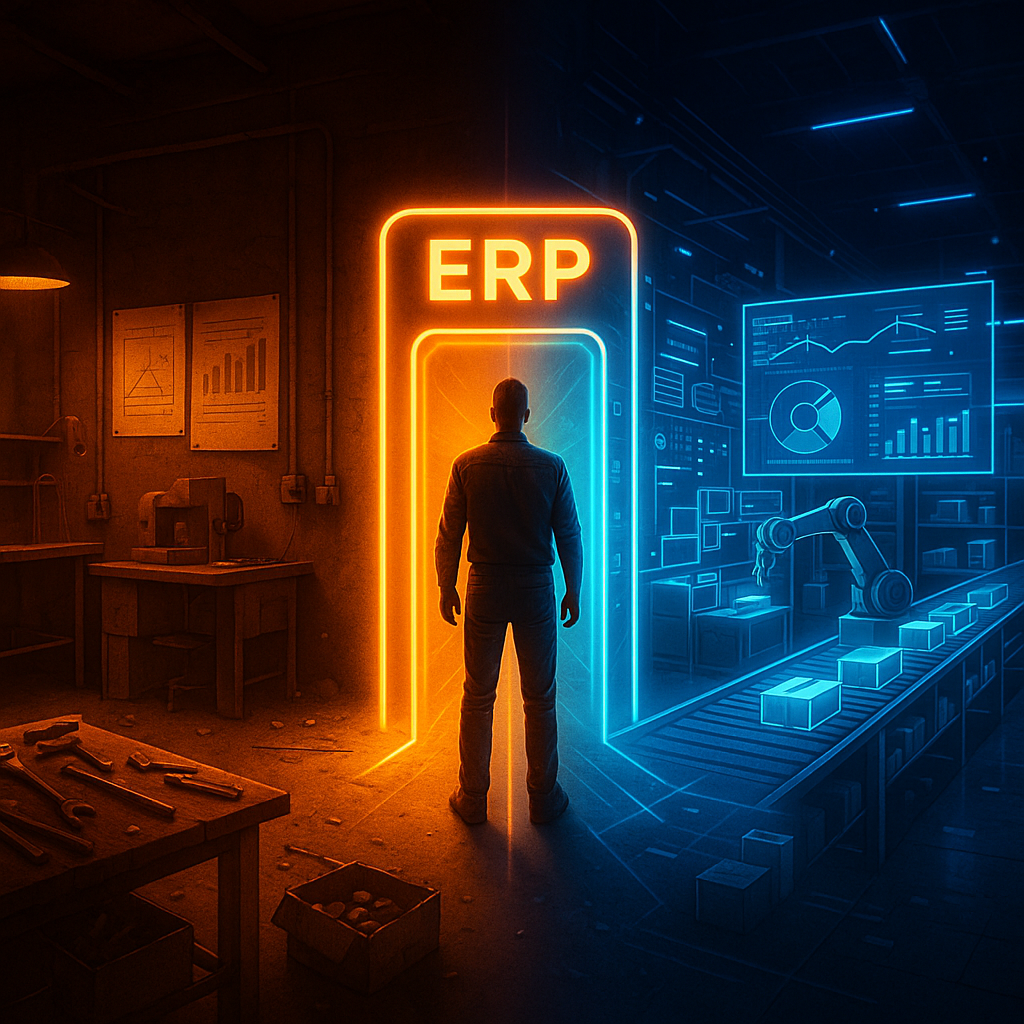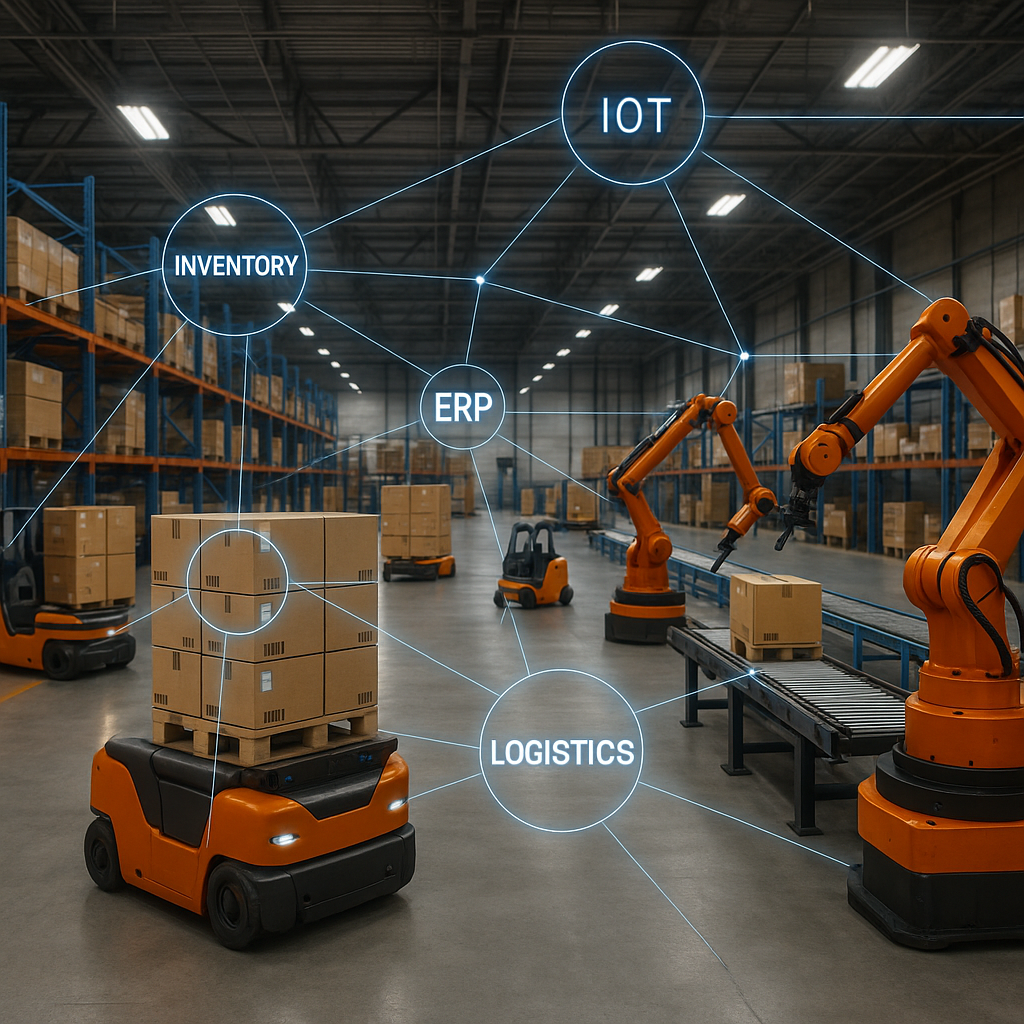Selecting ERP for Small Manufacturers: How to Choose the Right Fit for Your Business
For small and mid-sized manufacturers, every decision around systems and software has a real operational impact. Are your current tools giving you...
6 min read
 Blake Snider
:
Aug 18, 2025 2:50:24 PM
Blake Snider
:
Aug 18, 2025 2:50:24 PM
ERP deployment is a strategic decision that directly shapes your manufacturing company’s agility, cost structure, and long-term competitiveness. Whether you’re leading IT strategy as a CIO or managing infrastructure as an IT director, the debate between cloud ERP and on-premise ERPs is no longer theoretical, but operational, financial, and competitive.
According to Gartner, by 2027, more than 50% of organizations will embrace a cloud-first principle and will not be able to fully execute their digital strategies without the use of cloud-native architectures. This shift underscores the urgency for manufacturers to modernize their systems to stay competitive.
As of August 2025, most manufacturers are re-evaluating legacy systems in favor of scalable, connected platforms. But which model makes the most sense: cloud, on-premise, or a hybrid ERP deployment? This guide breaks down the core differences between cloud-based and on-prem ERP systems, highlighting what matters most for manufacturing environments.
A cloud ERP solution is hosted and maintained off-site by a third-party provider and delivered via the internet. Unlike traditional setups, businesses don’t need to manage physical infrastructure or servers. Instead, they subscribe to ERP functionality on a monthly or annual basis, making it a flexible, scalable solution. This model is especially attractive to small and mid-sized manufacturers who want to avoid large capital expenditures and quickly adapt to changing operational needs. Cloud-based ERPs also receive automatic updates, ensuring companies stay current with the latest features and security patches.
An on-premise ERP system is installed locally on a company’s own servers and maintained by its internal IT team. It typically involves a high upfront investment in hardware, software licenses, and ERP implementation services. However, this approach gives companies full control over their data, configurations, and security measures. Manufacturers that require custom integrations with shop floor machinery or those in highly regulated industries often favor on-prem ERP services for their adaptability and compliance control. This model demands a skilled IT department to manage system maintenance, updates, and troubleshooting.
Cloud ERP uses a subscription-based model, typically classified as operational expenditure (OpEx). It minimizes upfront investments and includes updates, maintenance, and support, making it appealing to smaller manufacturers. While costs are predictable, ongoing fees can exceed long-term expenses of an owned system. On-premise ERP, by contrast, demands large capital expenditure (CapEx) upfront but may offer better ROI over time for stable, resource-rich enterprises.
On-premise ERP systems provide deep customization by allowing IT teams to modify code and build proprietary modules tailored to unique workflows. This control is valuable for manufacturers with legacy equipment or specialized processes. However, customization can complicate upgrades, requiring manual intervention and additional testing. Cloud ERP favors configuration over customization, promoting system stability and easier maintenance.
Modern cloud platforms now support APIs, low-code tools, and modular extensions—balancing standardization with adaptability. This makes cloud-based ERP solutions appealing to manufacturers that prioritize quick deployment, easy integration, and long-term scalability.
Cloud ERP providers now deliver enterprise-grade security features like encryption, multi-factor authentication, and 24/7 monitoring. Most meet industry compliance standards such as SOC 2 Type II, ISO 27001, and GDPR—minimizing risk for manufacturers. For highly regulated sectors, on-premise ERP remains essential due to strict data residency and audit control needs. The trade-off is full responsibility for infrastructure security, which can stretch internal IT resources.
Cloud ERP systems are designed for dynamic scaling, allowing manufacturers to adjust resources as demand changes. Adding users, sites, or modules can be done rapidly without new infrastructure. This is ideal for manufacturers undergoing growth, seasonal spikes, or international expansion. On-premise ERP solutions scale slower and often require costly upgrades, which may slow time-to-market for new initiatives.
Manufacturers live or die by operational visibility. Cloud-based systems enable real-time tracking of inventory, production status, and financials, reducing lag in decision-making. When materials are delayed or demand surges unexpectedly, plant managers can respond immediately rather than waiting on manual reports. This is critical for lean manufacturing models and just-in-time (JIT) production strategies.
Modern cloud ERPs integrate seamlessly with IoT devices, AI-powered analytics, and robotic process automation. This enables capabilities like predictive maintenance, where sensors detect early signs of machine failure, and intelligent scheduling that adapts to shifting resource constraints. These integrations can drastically reduce downtime and optimize resource usage, driving competitive advantage.
In a post-pandemic world, remote access is a necessity. Cloud ERP systems enable executives, plant managers, and remote teams to access the same system from any location. This is particularly useful for manufacturers with geographically dispersed facilities or offshore supply chains. It also facilitates better collaboration with partners, suppliers, and vendors.
With cloud-based ERP solutions, supply chain functions like procurement, logistics, and vendor management are fully integrated into a single platform. This allows for real-time visibility into supplier performance, material availability, and production bottlenecks. By centralizing these processes, manufacturers can reduce stockouts, accelerate deliveries, and optimize inventory turnover.
Some manufacturers depend on legacy systems, highly specific workflows, or deeply integrated machinery that can’t be easily replicated in the cloud. For example, a manufacturer using proprietary production technology may need ERP software that tightly interfaces with equipment sensors or custom PLCs, something that cloud-based solutions struggle to support without expensive workarounds.
Certain industries have data sovereignty laws that restrict where information can be stored or processed. On-premise ERP ensures that all data stays within a controlled environment, eliminating concerns over international cloud server locations. This is especially important in jurisdictions with strict data privacy rules or military-grade information handling requirements.
Companies with robust internal IT departments may already have the skills and infrastructure to manage a secure, reliable ERP system. For these organizations, maintaining on-prem systems may offer greater control and faster troubleshooting, particularly when ERP functionality is closely tied to plant-floor operations.
| Feature | Cloud ERP | On-Premise ERP |
|---|---|---|
| Cost Model | Operational expense (OpEx), subscription-based | Capital expense (CapEx), one-time investment |
| Upfront Investment | Low | High |
| Maintenance | Handled by provider, included in subscription | Requires internal IT team |
| Updates & Upgrades | Automatic, frequent | Manual, often delayed or complex |
| Customization | Limited (via configuration); easier to maintain | Extensive; allows deep code-level changes |
| Deployment Speed | Fast (weeks) | Slow (months) |
| Security | Managed by vendor; enterprise-grade protocols and compliance | Fully controlled in-house; dependent on internal capabilities |
| Compliance | Meets general standards (SOC 2, ISO, GDPR) | Tailored to industry-specific or internal requirements |
| Scalability | Easy to scale; pay as you grow | Hardware-limited; scaling requires major investment |
| Accessibility | Accessible from anywhere via internet | Limited to on-site or VPN setups |
| Disaster Recovery | Built-in redundancy and recovery | Must be set up and maintained internally |
| Best for | Fast-growing or multi-location manufacturers | Large, stable enterprises with complex or legacy processes |
Startups and fast-growing manufacturers benefit from the scalability and cost-efficiency of cloud ERP. It enables rapid expansion without infrastructure headaches. Conversely, large enterprises with steady-state operations may prioritize long-term ROI from on-prem ERP systems that they can control and amortize over time.
Companies with limited internal IT support are better served by cloud ERP, where system maintenance and upgrades are handled by the provider. On the other hand, manufacturers with mature IT functions can exploit the flexibility of on-premise solutions, especially when deep integration and support are required.
If your manufacturing business operates in a tightly regulated field, verify that potential ERP vendors support necessary compliance standards. Cloud providers are increasingly compliant, but on-premise ERP may still be required to meet specific data protection, retention, or audit standards unique to your sector.
A hybrid ERP deployment combines cloud and on-premise systems to balance performance, control, and agility. Manufacturers may keep mission-critical processes like production management on-premise while moving HR, finance, or CRM functions to the cloud. This approach enables a phased transition to cloud environments without disrupting operations.
Hybrid ERP also supports data tiering, storing sensitive or regulated data on-site while leveraging reputable cloud tools for analytics and business intelligence. It’s an attractive strategy for manufacturers that want to modernize without abandoning valuable legacy investments. However, managing integration across cloud and on-prem systems adds complexity, requiring careful planning and middleware solutions.
There’s no universal answer. The decision between cloud or on-premise ERP depends on your manufacturing operation’s size, budget, customization needs, and compliance constraints. For many, the shift toward modern cloud ERP platforms offers better scalability, faster innovation, and lower TCO. But for others, traditional on-premise ERP systems remain critical infrastructure.
Understanding the trade-offs, anticipating future needs, and aligning your ERP deployment with business strategy are essential. If you're evaluating options, don't do it alone. Schedule a consultation with Astra Canyon to align your ERP deployment with your strategic goals.
Astra Canyon is a proven leader in delivering tailored ERP solutions to the manufacturing industry, with a particular focus on IFS Cloud. Backed by over two decades of hands-on experience, our team includes more than 80 IFS-certified consultants who have successfully led over 250 ERP implementations across discrete and process manufacturing, as well as distribution sectors.
Top manufacturing organizations like Kodiak, PowerSecure, Barnhart, ESG, and HCR have relied on Astra Canyon to modernize their ERP infrastructure, streamline supply chain operations, and enhance plant-floor efficiency. One notable example is Nomad Global Communication Solutions, where Astra Canyon implemented IFS Cloud to replace legacy systems, achieve Department of Defense compliance, and unify manufacturing and field services within a single platform. Watch our clients share their experience to see how we help manufacturers stay ahead.
Curious about which platforms are leading the market? Check out our list of top ERP systems for manufacturing.

For small and mid-sized manufacturers, every decision around systems and software has a real operational impact. Are your current tools giving you...

Are you confident your ERP system can keep pace with what’s coming? Manufacturers are already rethinking what ERP should do, moving beyond...

The Industrial Internet of Things (IIoT) is no longer an experimental concept. As of August 2025, manufacturers that combine IoT technologies with...